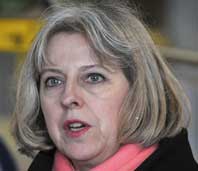Theresa May the Home Secretary, pictured, has told Parliament she has pledged legislation to give the IPCC powers to investigate private sector companies working for the police.
She said she was prepared to consider any further legislative changes requested by the Independent Police Complaints Commission (IPCC), the police watchdog.
The IPCC to be expanded to deal with all serious complaints against the police, the Home Secretary announced. She also announced:
the College of Policing will publish national registers of chief officers’ pay packages, gifts and hospitality, second jobs, and their contact with the media;
the College will also publish a new code of ethics to be distributed to officers of all ranks; the College will work with ACPO to create a single set of professional standards on which officers will be tested throughout their careers;
a national register of officers struck off from the police will be managed and maintained by the College;
disciplinary hearings against officers who resign or retire will be pursued until their conclusion – with anyone found guilty of misconduct added to the struck-off list; and
the College will establish a stronger and more consistent system of vetting for police officers, which chief constables and police and crime commissioners will have to consider when making decisions about recruitment and promotion
She said the package of reforms would strengthen the relationship between the public and the police. Theresa May said: ‘This country has the finest police officers in the world and the vast majority conduct themselves with the highest standards of integrity.
‘But it is vital to ensure public confidence is not damaged when individual cases of corruption happen. This package of reforms will see all serious allegations investigated independently, a new code of ethics introduced, tougher rules around misconduct hearings, increased vetting of officers and more transparency around police business. They will mean the public can have full faith in the police and will strengthen the link between officers and the people they serve.’
Last year, the Home Office pointed out, the IPCC led investigations into only 130 of the 2,100 cases referred to it, with the remainder returned to individual police forces to investigate. But over the same period, nearly a third of all internally-investigated complaints against the police were found to have been mishandled at appeal.
The Home Secretary said she would draw on the resources devoted to the internal professional standards departments of police forces to provide the increased capacity for the IPCC. She has written to chief constables, the newly elected Police and Crime Commissioners, the IPCC and Her Majesty’s Inspectorate of Constabulary to ask for their views on the best way to transfer resources.
To aid its investigation into the findings of the Hillsborough Independent Panel, the IPCC was given extra powers to compel officers to attend interviews and to investigate matters already scrutinised by its predecessor organisation.










